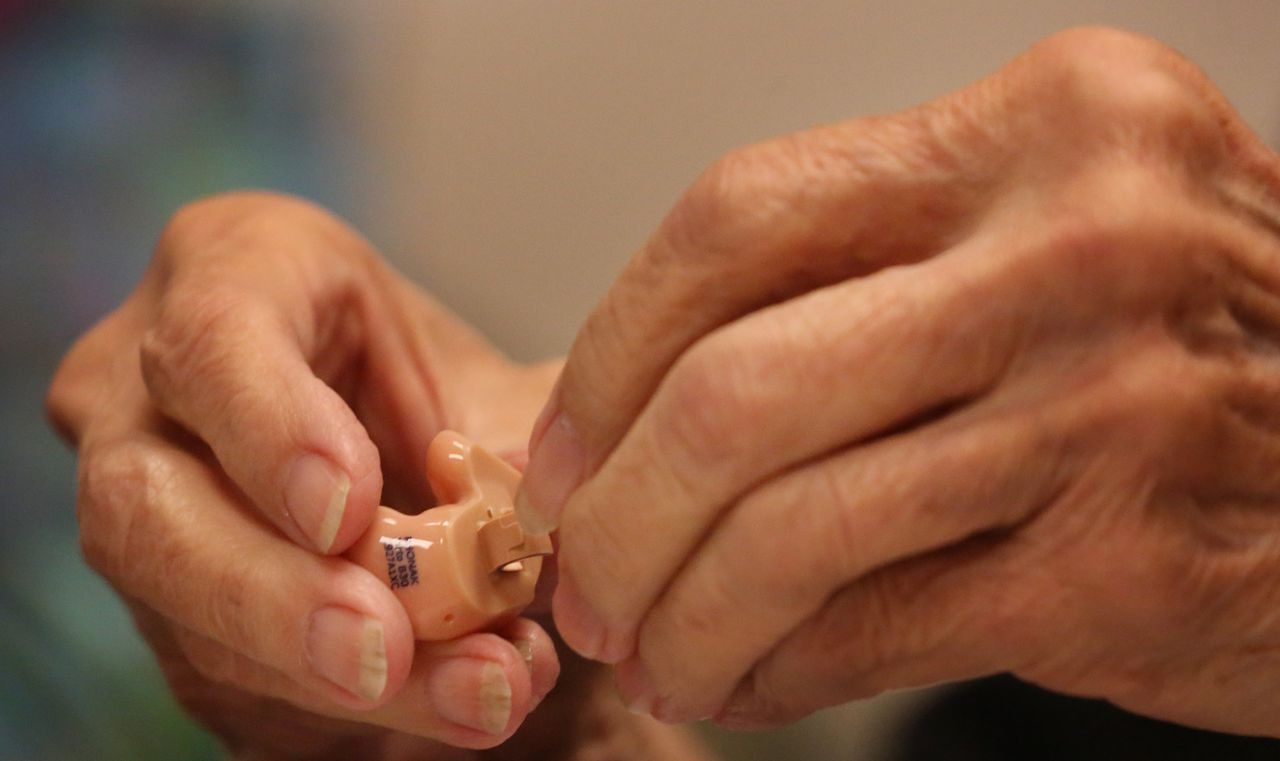Hearing Aid Prices On Medicare
Theres no such thing as a Medicare discount for hearing aids. Hearing aids are costly, and you must be fitted for them by your audiologist. The average cost of a single digital hearing aid is $3,000 to $4,000. Some retailers offer hearing services. Their advertised prices are less than you might pay at an audiologists office. But even though these retailers, a pair of hearing aids can cost thousands of dollars.
This factor of cost is one reason only about one in four adults who could benefit from hearing aids has used them. Many people wait years before finally getting hearing aids. If you need help with the cost of your hearing aids, do an online search for assistance paying for hearing aids in your state.
Does Medicare Pay For Hearing Aids
Original Medicare does not pay for hearing aids typically, but it may cover hearing exams. Some Medicare Advantage plans may cover hearing aids, however. In fact, 88% of Medicare Advantage plans cover hearing aids in 2021.
- Medicare consists of different parts. Original Medicare Part A is hospital insurance and does not cover hearing aids or provide coverage for hearing exams.
- The medical insurance part of Original Medicare, Part B, may cover some hearing health expenses for beneficiaries, depending on their circumstances.
Many Medicare beneficiaries choose to receive their Part A and B benefits through a bundled Medicare Part C plan, often called a Medicare Advantage plan. These plans must offer at least the same level of coverage as Original Medicare, and they typically cover additional benefits.
Part C plans must at least match Medicare Part B hearing care coverage, and many plans also cover benefits such as prescription drugs, eye exams and glasses, dental care and hearing aids.
It’s important to note that not all Medicare Advantage plans are available in all areas, and there may not be plans available where you live that cover hearing aids.
Help With Amplified Telephones
Many states have telecommunication distribution programs for people with hearing loss. These programs provide Text Telephones , amplified telephones and other equipment free of charge for people with hearing loss or other related disabilities.
A listing of programs by state can be found at the Telecommunications Equipment Distribution Program Association using the State Directory link.
Contact your states program for more information about eligibility and what equipment is provided.
Also Check: Hungry Asl
Youre Our First Priorityevery Time
We believe everyone should be able to make financial decisions with confidence. And while our site doesnt feature every company or financial product available on the market, were proud that the guidance we offer, the information we provide and the tools we create are objective, independent, straightforward and free.
So how do we make money? Our partners compensate us. This may influence which products we review and write about , but it in no way affects our recommendations or advice, which are grounded in thousands of hours of research. Our partners cannot pay us to guarantee favorable reviews of their products or services.Here is a list of our partners.
Additional Resources For Help With Hearing Aids

If you have Medicare and need help paying for a hearing aid, there are some programs that might be able to offer some assistance.
- Foundation for Sight and Sound provides hearing aids to individuals with limited financial resources. Visit their website for more information about the program.
- If youre a veteran, you may be eligible for financial help for your hearing aids through the U.S. Department of Veterans Affairs.
- Some local organizations such as the Lions Club International may also be able to help people with hearing problems. Reach out to your local branch to find out if you qualify for assistance.
- Medicaid may cover hearing aids in the following states:
- AK, CA, CT, D.C., FL, GA, HI, IN, KS, KY, ME, MD, MA, MT, NE, NH, NJ, NM, ND, OH, OR, RI, SD, TX, VT, WI, WY
Don’t Miss: Asl Hungry
How Is Hearing Loss Diagnosed
If you are having trouble hearing, see your health care provider. He may refer you to an ear, nose, and throat specialist to determine if there is a medical cause for your hearing loss. You may also see an audiologist for a hearing test. Hearing tests can help identify the cause of the hearing loss and also measure its severity.
How Is Hearing Loss Treated
Depending on the type and severity of your hearing loss, your doctor may recommend hearing aids to amplify sounds so you can hear them better. In some cases, if hearing aids arent effective or the hearing loss is more severe, your doctor may recommend cochlear implants. A cochlear implant is a tiny device surgically inserted into the inner ear to help produce a sense of sound. Your doctor may suggest implants for one or both ears, depending on your condition.
Also Check: Why Does My Phonak Hearing Aid Beep
Which Medicare Plans Should You Select If You Know You Need Hearing Aids
You should select a Medicare Advantage plan available in your area that includes extra benefits for hearing if you know you need hearing aids. If you dont have hearing aids yet, but you anticipate needing them based on your family history, you should consider MA plans with hearing aid benefits.
If you are already working with a professional for your hearing and hearing aids, its a good idea to check with your provider to see which MA plans include them in their network.
If you already have a MA plan with hearing aid benefits, consider making an appointment with their in-network audiologist to conduct a screening or exam to determine if you have hearing loss and whether or not it could be helped by hearing aids.
Search for plans here. You will input your zip code to begin the search for Medicare plans that are offered in your area.
- Select Medicare Advantage plans to find plans with hearing aid coverage.
- Take the time to compare plan benefits and providers.
- Contact the plan to discuss details
- Review the EOC document that is associated with each plan. You can find this by clicking on Plan Details, then scrolling to find the EOC. One more click, and you should be able to view the EOC. Refer to the table of contents to find the details about hearing benefits.
National And State Resources For Free Hearing Aids
Many agencies and foundations at the national and state levels provide assistance to seniors in purchasing hearing aids. For seniors seeking financial hearing aid assistance, it is just a matter of contacting these foundations and filling out any necessary applications to see if you qualify for help. It can take some time, but if it saves you thousands of dollars, we think it is worth it!
For a list of financial assistance options, visit HearingLoss.org. You may also find an option through the list provided by the Hearing Aid Project at the state or national level. Your local Area Agency on Aging may also be able to direct you to local resources.
Starkey Hearing Aids Lineup
You May Like: How To Say Angel In Sign Language
What Is Meant By Medically Necessary
Remember that patients who have coverage with Original Medicare generally must pay 100 per cent of hearing tests and hearing aids because they are routine care. If the healthcare provider suspects you may have a disorder that will require medical treatment, and a balance test or hearing exam is required for proper diagnosis, then Medicare Part B may cover up to 80 per cent of Medicare’s allowable rates after you pay any necessary deductible). To help you understand medical necessity, consider the case of a patient who presents to the doctor reporting at least two episodes of vertigo, each of which had a duration of between 20 minutes and 24 hours . The patient may have experienced vertigo or a full sensation in the ears and reported hearing loss. The hearing test would then be needed to confirm the hearing loss.
Can You Get Free Hearing Aids From The Veterans Health Administration
Hearing loss is the most common service-related injury for U.S. veterans.2 If you were in the service and are experiencing hearing loss in your golden years, the Veterans Health Administration, which is part of the U.S. Department of Veterans Affairs , may be able to give you free hearing aids, or at least a significant discount on them.
Don’t Miss: Sign Language For Pooping
Medicare Currently Provides Health Insurance Coverage To More Than 60 Million Americans But There Are Some Notable Exceptions Which Progressive Hope To Address
In 2020 more than 18% of Americans were covered by at least one Medicare plan, and close to $1 trillion was spent by the federal government during the course of the year. Around 54 million of the 62 million who are enrolled in the programme are eligible due to their age, while the other 8.5 million qualify because of a disability.
But Medicare, which was first introduce in 1965, is far from exhaustive and some major healthcare sectors are not currently covered by the programme. Hearing aids and vision examinations are typically not covered by Medicare plans.
You May Like: How To Teach Yourself American Sign Language
Medicare Advantage Plans May Cover Hearing Aids

Now, back to hearing aids. Original Medicare wont cover these often-important hearing health devices, but there are Medicare Advantage plans and Medicare supplement insurance plans that do. Additionally, many Medicare Advantage plans will also pay for routine hearing-related exams and services.
What specific hearing health services and items are covered will vary by plan, so be sure to look carefully at the plans available in your area and to ask how coverage and costs work.
Also Check: Is Sign Language The Same In Every Language
What Is Included In Hearing Aid Coverage
Coverage details will depend on exactly which plan and insurance provider you have, so its best to contact your Glendale Medicare insurance agent to get accurate information about your own plan or to switch to a different one that will better meet your health needs.
Generally speaking, Medicare Advantage provide coverage for hearing tests, which can help determine whether someone would benefit from a hearing aid, along with the cost of the hearing aid devices themselves and the fitting process. Maintenance costs, such as new batteries, and repairs are often also covered. Sometimes, an insurance will require a co-pay for help cover the cost while others may provide a fixed allowance amount that a person can spend on hearing aids.
Nonprofits That Help With The Cost Of Hearing Aids
-
Sertoma is a service organization that provides a list of organizations, by state, which helps disadvantaged individuals with obtaining hearing aids.
Sertomas non-profit program, SHARP is funded by Sertoma civic clubs located nationwide. SHARP accepts hearing aid donations and recycles the devices to provide hearing aids to low-income individuals. A one-time fee is required.
-
The National Hearing Aid Project is a collaborative effort offered by the Hearing Charities of America . The National Hearing Aid Project addresses the need for hearing aids, for low-income people, nationwide.
The project combines several organizations across the U.S. to fulfill the need for hearing aids. HCOA works with the University of Kansas to refurbish and track all hearing aids used in the program. After you complete the application process and are accepted into the program, you will receive hearing aids. Follow-up evaluations, fittings, and services complete the process.
-
Hear Now is an application-based program sponsored by the Starkey Hearing Foundation. This program provides hearing assistance to Americans with limited income. Hear Now fits each accepted patient with new, digital hearing aids customized to their needs. Hear Now is made possible through the generous donation of time and services of audiologists and health professionals nationwide.
You May Like: How To Say Sorry In Sign Language
Some Medicare Advantage Plans Cover Hearing Aids
Medicare Advantage Plans are health plans offered by private companies that contract with CMS. These plans provide the same benefits and coverage as Original Medicare and most include prescription drug coverage as well.
Added benefits like vision, dental and hearing are included in some Part C Plans. Medicare Advantage Plans that cover routine hearing tests and hearing aids may charge higher premiums. Its important to carefully compare all health insurance options to ensure you get the coverage that meets your needs and budget. Medicare provides an online tool that beneficiaries can use to find and compare different plans.
Changes to Medicare elections can be made during certain times called enrollment periods. Aside from the initial Medicare enrollment period, the annual Open Enrollment Period for Medicare Advantage and Prescription Drug Coverage is the most well known.
To determine if your Medicare Advantage Plan or other health insurance covers audiology services like hearing aids or cochlear implants, check with your individual plan. Most plans list a toll-free number for member services on their insurance cards.
Spider Silk Could Help Build A Better Hearing Aid Heres How
Medicare would likely reimburse manufacturers at prices lower than they currently receive, as it does for other health care goods and services. The Department of Veterans Affairs has had success paying just $400 per hearing aid, about $2,000 less than the private market. Further research is needed into how the VA policy affects veterans access and health outcomes, as well as manufacturer contracts. This policy could go two ways: lower prices could slow innovation in hearing aid technology, or an expanded market could increase innovation because it raises potential revenue even at Medicare prices.
Medicare coverage for hearing aids could be structured in several ways. For example, The Commonwealth Fund proposes that Medicare beneficiaries pay a $25 monthly premium for bundled vision, hearing, and dental services. Others may recommend the services simply be added under the umbrella of Medicare Part B. Should Roybal-Allards bill pass, the regulations that emerge from it will greatly influence the laws impact on access.
The Eyes, Ears, and Teeth Act doesnt address Medicaid or private insurance coverage for hearing aids. But changes to Medicare coverage might prompt other types of insurance to reassess their own coverage of these necessary devices.
Also Check: How To Sign Poop In Asl
Qualifying For Disability Without Meeting A Listing In The Blue Book
Just because your hearing loss does not meet the SSA Blue Book listing guidelines does not mean that you cannot be approved for SSDI benefits. You can still qualify for SSDI by meeting the requirements of a residual functioning capacity form . This is a detailed form completed by your physician that explains how your ability to work has been impacted by your hearing loss.
Using the RFC for the medical vocational allowance listing, the SSA looks at your age, your educational level, job skills, any training, work history and any other factors that can determine what kind of work for which you are qualified and if you can transition over to some other kind of employment.
Disability Determination staff will use the RFC and any medical records to complete a comparison to determine any daily limitations in regards to normal tasks such as buying groceries, cleaning your home, preparing meals, running errands or even participating in hobbies or caring for your pets.
As an example, if you have predominantly worked in a retail setting and have experienced severe hearing loss, you will be unable to effectively communicate with your customers. In this situation the RFC may be deemed sufficient in helping you to qualify for SSDI benefits.
Will Coverage On Hearing Aids Change
Over the years, many organizations and lawmakers have tried to update Medicare to cover vision, hearing and dental costs for seniors.
Many people would like to see Medicare evolve to cover dental, vision and hearing care. A Commonwealth Fund report details the financial and health burdens these gaps place on older adults. The report said:
“Among Medicare beneficiaries, 75 percent of people who needed a hearing aid did not have one 70 percent of people who had trouble eating because of their teeth did not go to the dentist in the past year and 43 percent of people who had trouble seeing did not have an eye exam in the past year.”
However, so far, no one has been successful at getting changes made to this part of Medicare coverage. In the summer of 2019, several U.S. representatives introduced H.R. 4056, a bill that would require Medicare to pay for certain audiological services. Time will tell if this bill gets passed.
Read Also: Hungry Sign Language
Democrats Plan To Expand Medicare Hearing Benefits What Can Consumers Expect
By Rachana PradhanNovember 5, 2021
We encourage organizations to republish our content, free of charge. Heres what we ask:
You must credit us as the original publisher, with a hyperlink to our khn.org site. If possible, please include the original author and Kaiser Health News in the byline. Please preserve the hyperlinks in the story.
Have questions? Let us know at
Blue Cross Medicare Supplement Or Legacy Medigap

Blue Cross Medicare Supplement plans do not include routine hearing exams, hearing aid fittings or hearing aids. You may choose to pair a new or existing Blue Cross Medicare Supplement or Legacy Medigap plan with the Dental Vision Hearing Package that includes coverage for an exam and hearing aids. It also includes dental and vision benefits.
Learn more about how to get coverage for your Blue Cross Medicare Supplement or Legacy Medigap plan.
This is a solicitation of insurance. We may contact you about buying insurance. Blue Cross Medicare Supplement plans arent connected with or endorsed by the U.S. government or the federal Medicare program.
Don’t Miss: American Sign Language Hungry